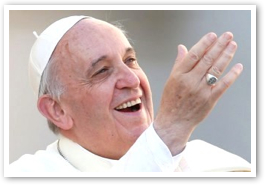The Church's loyal son
- FATHER RAYMOND J. DE SOUZA
Pope Francis warns against giving moral questions too much emphasis, but many are enthused by him precisely because they give all their attention to moral questions.
 Pope Francis, who marks the second anniversary of his election tomorrow, continues to fascinate the world and remains enormously popular. Much of the commentary on the anniversary seeks to explain just that: Why does he remain so popular? I would suggest three reasons — the first which I hope is true, the second which I worry is true, and the third, which I believe is true.
Pope Francis, who marks the second anniversary of his election tomorrow, continues to fascinate the world and remains enormously popular. Much of the commentary on the anniversary seeks to explain just that: Why does he remain so popular? I would suggest three reasons — the first which I hope is true, the second which I worry is true, and the third, which I believe is true.
In 2005, Pope Benedict XVI taught in his first encyclical that the Church had three fundamental duties: the preaching of the gospel, the worship of God, and the service of charity. For most of the past 50 years, the Church's energies have been occupied with confusions and controversies on the first two of those three. Consequently, the service of charity has been given relatively less attention. Francis has a transparent heart for the poor and afflicted, lifting up the work the Church has usually devoted most of her energies toward: the care of the poor and afflicted, the sick and the vulnerable, the weak and neglected.
Yet as the culture has changed, despite the fact the Church spends far more time on care for the poor than she does on contested moral questions, the public profile of the Church has focused on the latter rather than the former. My hope is that people respond so favourably to Francis precisely because they recognize in him the Christian mandate to see, as Mother Teresa put it, the "face of Christ in the distressing disguise of the poor."
However much I would like that to be the case, it is undoubtedly true that there are many who are excited about Francis who demonstrate no particular interest in the poor, hence my worry. For many, Francis is popular because they see him as (finally) raising the white flag of surrender to the dominant social phenomenon of our time, the sexual revolution. Francis has indicated that before the Church has anything to say about sexual morality, she has a lot to say about the merciful love of God revealed in Jesus Christ. The moral life follows as a consequence — an important consequence, but nonetheless a consequence. Francis's change in emphasis has been regarded by many as a change in doctrine, which he has said explicitly that he cannot and will not do.
Pope Francis warns against giving moral questions too much emphasis, but many are enthused by him precisely because they give all their attention to moral questions, and think Francis will take the Catholic Church in the direction of liberal Protestantism on those issues. It is this mistaken understanding of Francis's pontificate that both creates excitement and dismay, high expectations and great apprehensions.
That offers both opportunities and involves risks, but it does correspond to how our culture likes its leaders, as companions on the way rather than guides indicating the path to be followed.
Then there is what I think is the truth about the great resonance of Pope Francis in contemporary culture. As mighty a cultural juggernaut as secularism is, it cannot snuff out the desire of the human heart for the transcendent. The usual formulation for this is a desire to be spiritual, but not religious. Pope Francis corresponds very well to that aspiration, for he is often understood not so much as a figure of the Church, but in juxtaposition to it. It's an odd reception for a man who describes himself as a "loyal son of the Church," but nevertheless it is real. His adoption of a simpler papal style is often interpreted as distancing himself from the office he holds. His language is widely accessible precisely because he speaks most often, including in his frequent interviews, as a fellow believer, not an authoritative teacher. Indeed, the defining phrase of his pontificate — Who am I to judge? expresses just that.
The task of leadership, pastoral leadership included, depends upon both personal charisma and the charism of office. A pope can rely more on one than the other, but needs both. Francis, more than his immediate predecessors, relies on his person, content to offer himself — in interviews, in private phone calls and meetings, in direct actions independent of his collaborators — more than he stresses the entire weight of his office as universal pastor of the Church. That offers both opportunities and involves risks, but it does correspond to how our culture likes its leaders, as companions on the way rather than guides indicating the path to be followed.
Wherever Francis goes, whatever Francis does, it makes news. And because Francis does not desire to be the news himself, it means the Church is news and the gospel of Jesus Christ is news. Whether that is the news the world desires remains to be seen, but it is undoubtedly paying attention.
 This is Meaghen Gonzalez, Editor of CERC. I hope you appreciated this piece. We curate these articles especially for believers like you.
This is Meaghen Gonzalez, Editor of CERC. I hope you appreciated this piece. We curate these articles especially for believers like you.
Please show your appreciation by making a $3 donation. CERC is entirely reader supported.

Acknowledgement
 Father Raymond J. de Souza, "The Church's loyal son." National Post, (Canada) March 12, 2015.
Father Raymond J. de Souza, "The Church's loyal son." National Post, (Canada) March 12, 2015.
Reprinted with permission of the National Post and Fr. de Souza.
The Author
Father Raymond J. de Souza is the founding editor of Convivium magazine.
Copyright © 2015 National Post



